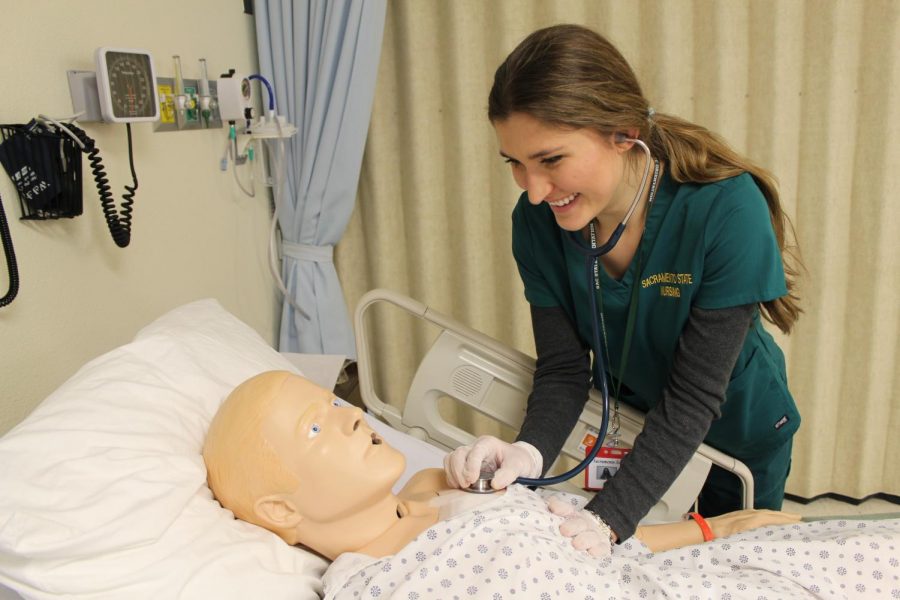Sac State ranked one of top nursing programs in California
Sierra College was the only Sacramento-area college ranked higher
Jasmin Acosta – The State Hornet
Nursing student, Danielle Baldwin, using a stethoscope on a realistic simulation mannequin in one of Sacramento States laboratories in Folsom Hall. Simulation labs allow nursing students to gain essential skills and a “hands on” experience.
February 25, 2019
Sacramento State’s registered nursing school program was ranked 14 out of 126 accredited nursing schools in California by Registered Nursings’ website in its 3rd Annual State RN program rankings.
For the Sacramento area, Sac State outranked local community colleges including Sacramento City College (24), and American River College (30), but came in behind Sierra College (7).
Sac State’s competitive Clinical Nursing Program remains the second best RN program in the area, proved by its high number of student applicants each year.
To select each school’s ranking, Registered Nursing uses the National Council Licensure Examination (NCLEX) pass rates to determine a student’s preparedness for entry-level nursing practice.
The NCLEX is a standardized exam required to obtain a nursing license, which grants nursing graduates permission to practice nursing in the state where they pass the exam.
According to its website, numerous state boards of nursing use a school’s overall NCLEX pass rates to approve a school’s ability to provide a nursing education in that state. The exam is also required for licensure and is used by all state boards of nursing in the United States to assess a student’s competency.
The NCLEX evaluates if a student is knowledgeable and has the expertise to enter the nursing field to begin practicing as an entry-level nurse. The examination covers client need categories such as psychosocial integrity, physiological integrity, practices on a safe care environment and health promotion and maintenance.
According to Registered Nursing’s website, for students interested in pursuing their academic future in the nursing field, it is important to choose a school that “supports students towards licensure and beyond.”
Chairperson of Sac State’s School of Nursing, Tanya K. Altmann, said the dedication of the faculty is what sets the program apart.
“Our faculty are known for going above and beyond to help students reach the high bar for academic excellence set by the School of Nursing,” Altmann said. “Many of the faculty are active in the community maintaining their nursing skills which they translate to their teaching.”
In 2011, Sac State’s nursing department established a competitive selection process due to applications exceeding program space, which is listed on the impaction page of Sac State’s website.
Sac State provides varying programs that prepare students to become nurses such as a Bachelor of Science in Nursing, Master of Science in Nursing, and certifications for Licensed Practical and Registered Nurses.
“I didn’t understand what all the praise was about, but the most defining feature of Sac State’s nursing program is how supportive everyone is, from the teachers, office and lab staff,” said nursing major Ray Mercado.
Nursing students are required to complete eight prerequisite and four corequisite courses, and receive a passing score above 75 percent on the Test of Essential Academic Skills before being eligible to apply to Sac State’s nursing program.
Nursing major Isabella Nguyen said students must earn their acceptance into Sac State’s nursing program by completing all of the required prerequisites before being granted admission.
According to Sac State’s bachelor of science in nursing applicant pool statistics, only 77 out of 500 student applicants were enrolled into the program for the Fall 2018 semester.
“I chose Sac State’s nursing program because it has a really good reputation and entrance isn’t based off of a lottery,” Nguyen said. “When I applied the selection criteria was heavily weighted on the amount of work I put into trying to get in, it was something I had to earn.”
Nguyen said Sac State has earned its high rank and the nursing department staff deserves the recognition for such academic success.
“The professors and instructors are the backbone of this program. They’re amazing and they’re doing everything in their power to help students do well and succeed,” Nguyen said. ”I’m beyond proud to be part of this nursing program.”


























































































































Samantha • Oct 9, 2019 at 7:57 am
Nice spin article, but RN program at CSU Sacramento is a joke. From a personal perspective (and knowing several other students who went there) the administration is fueled by personal politics and does very little time teaching. They will actually get irritated at students–or worse–just for asking questions. I knew at least one student who made a major medication error (almost killed a patient) and was graduated because the instructor liked her.
As far as the impaction rate, yes, it is hard to get into, but that is par for the course not just for RN programs but for Sac/CA resources in general–too many people who need them, too little to go around.
tk • Jun 12, 2019 at 8:00 pm
NO this article IS NOT misleading, please read. The community college nursing programs in our region are completely independent, offering strictly an Associates in Nursing(ASN). Nursing programs are ranked based on NCLEX pass rates, whether it’s a BSN(Bachelors) or ASN, they are ranked equally. Now to Ron’s confusion. CSUS has a joint effort with a few local colleges and offers ASN-to-BSN bridge program, which means that the ASN student takes a few more semesters and gets a BSN from CSUS. But the ASN programs are still very valid, and the schools that house them are judged based on the student’s NCLEX pass rates. Good Job Seirra College. BUT WAIT, NOW, the NCLEX, should it really rank schools based on students pass rates? NO, Absolutely not. The NCLEX simply rates the students preparedness for the exam. As most nursing students know, every new grad studies for the NCLEX like there is no tomorrow. This means those rankings do not really reflect the school, at all (sorry Sierra College), just the students hustle before the NCLEX.
Ron • Apr 21, 2019 at 7:19 am
This article is misleading in that Sierra College’s bachelors degree in nursing is a Sac State program. How can you say it is ranked higher than Sac State. You do know that Sierra is a community college, and that the community college does not offer stand alone bachelors degrees.